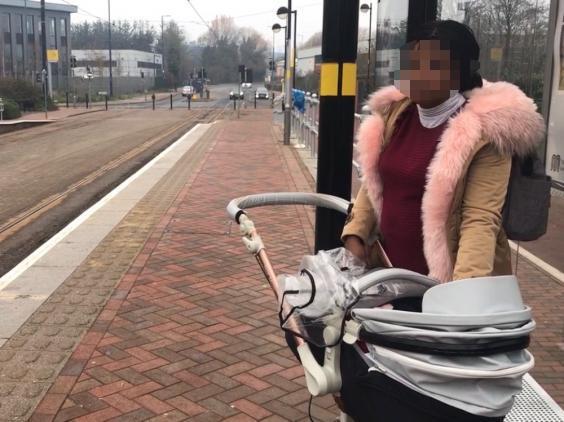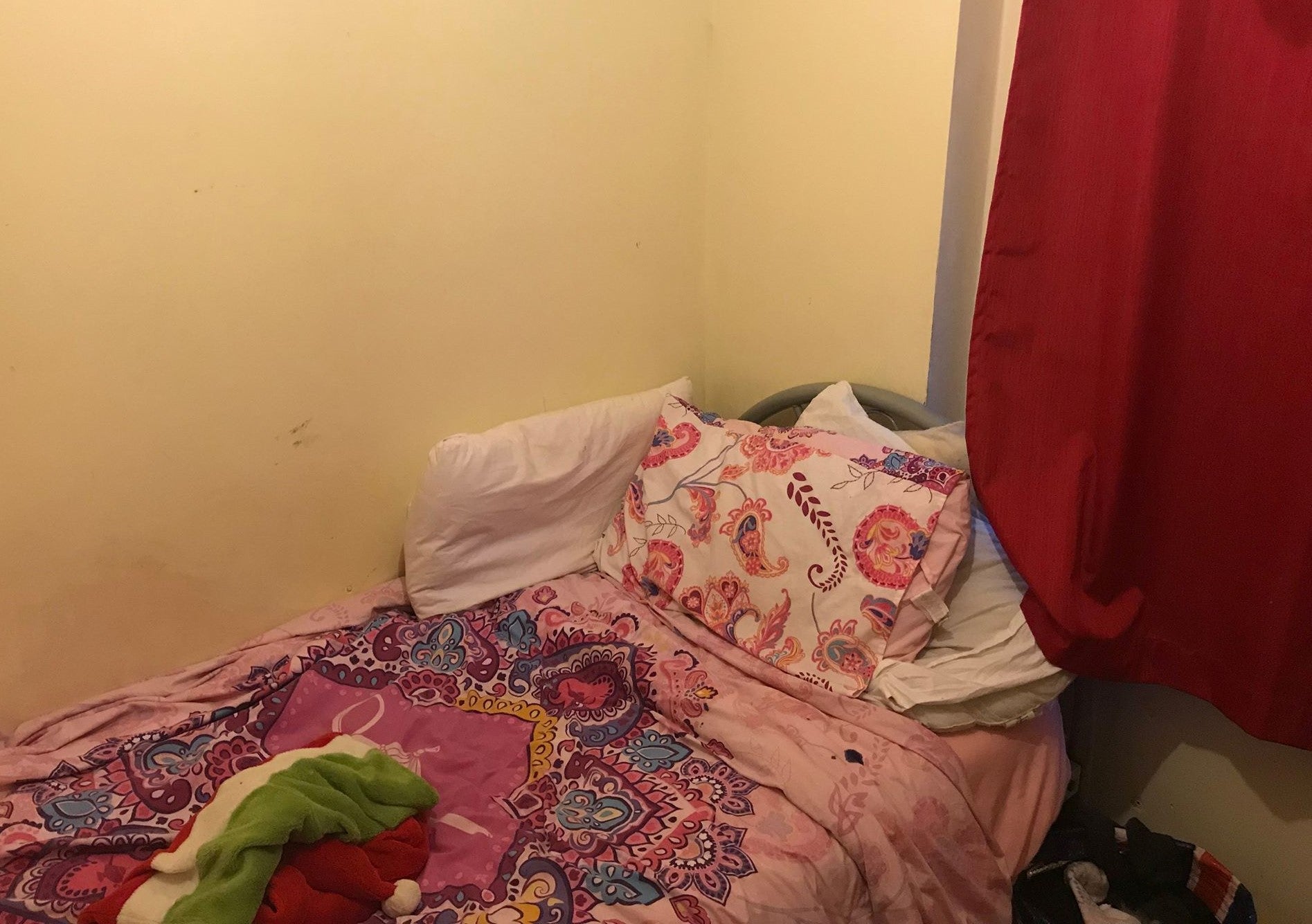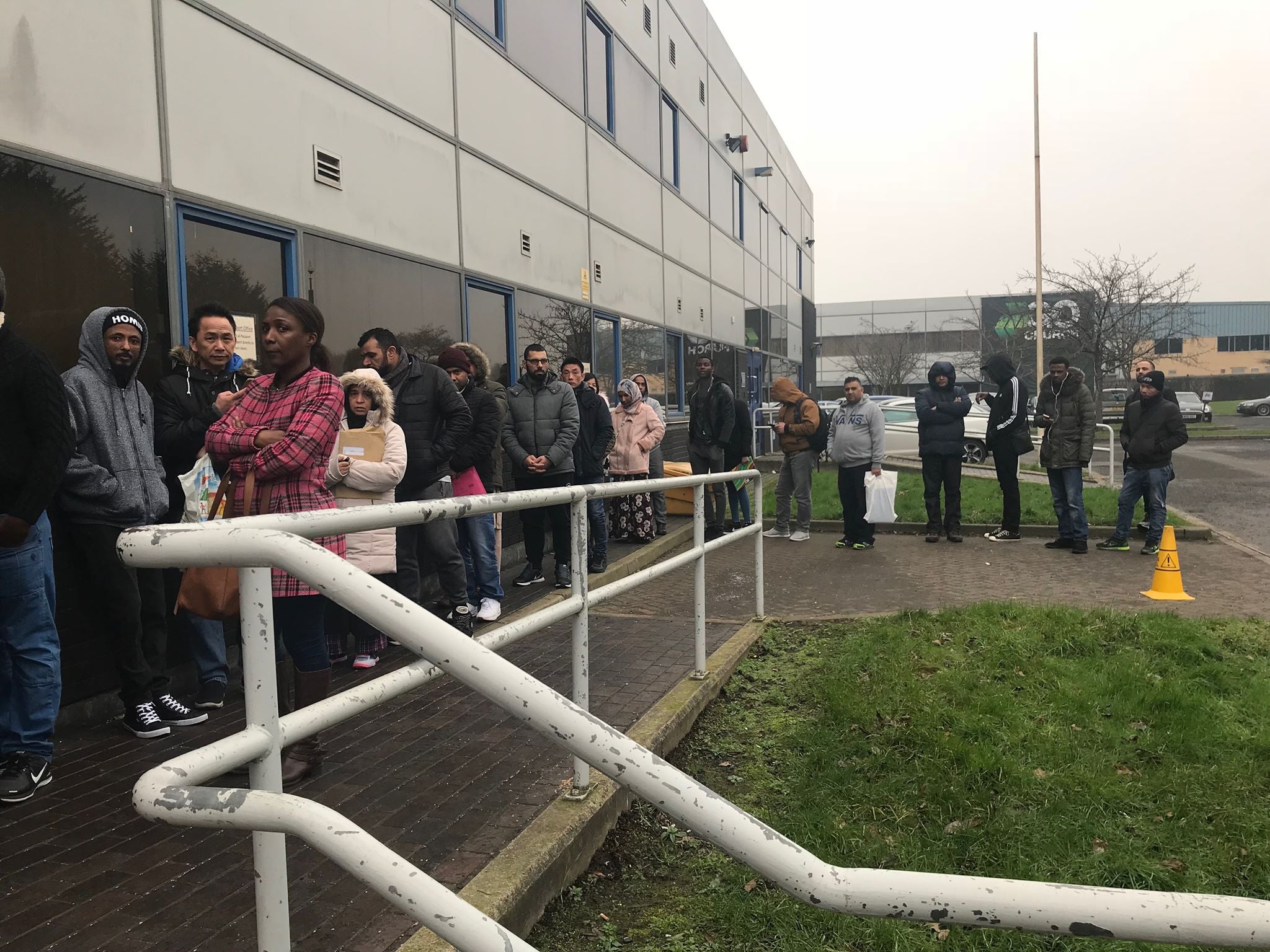Two trains, three trams, 5,000 steps: How a mother and baby have to travel five hours to sign on with the Home Office
Naija* has been told she must travel from her asylum accommodation in Stoke-on-Trent to a reporting centre in Manchester to comply with Home Office immigration rules. The Independent accompanies her as she makes the complex journey with a five-month-old child

Your support helps us to tell the story
From reproductive rights to climate change to Big Tech, The Independent is on the ground when the story is developing. Whether it's investigating the financials of Elon Musk's pro-Trump PAC or producing our latest documentary, 'The A Word', which shines a light on the American women fighting for reproductive rights, we know how important it is to parse out the facts from the messaging.
At such a critical moment in US history, we need reporters on the ground. Your donation allows us to keep sending journalists to speak to both sides of the story.
The Independent is trusted by Americans across the entire political spectrum. And unlike many other quality news outlets, we choose not to lock Americans out of our reporting and analysis with paywalls. We believe quality journalism should be available to everyone, paid for by those who can afford it.
Your support makes all the difference.“I haven’t been sleeping properly,” says Naija*, 34, zipping her smiley five-month-old into a donated puffer coat. It’s 8am in Stoke-on-Trent, and the single mother has been ordered to report to a Home Office centre 50 miles away in three hours’ time or risk being detained.
The Nigerian national is too nervous to eat. “I’m so anxious about my asylum claim anyway. This has made me more stressed,” she says, placing two bottles of milk in a bag. The journey is to Manchester – a five-hour round trip on multiple trains and trams – and with no childcare, she is going to have to take her baby.
Naija is one of around 500 asylum seekers in Stoke-on-Trent forced to take this journey after the Home Office closed their local immigration reporting centre. Over the past year, centres have been closing across the country, including in Portsmouth, Bristol and Nottingham, as a way to “more effectively manage” the reporting population, which includes thousands of asylum seekers.
Charities say the closures mean disabled people and parents with young children must make long and expensive journeys to “sign on” in compliance with immigration rules – already a traumatic experience for many – but the Home Office refuses to cap the distance they can be told to travel.
Naija’s other daughter Olusola, aged nine, is getting ready for school. She wears a blazer and tie and packs her school books from the window sill in her tiny, sparse bedroom. “It’s hard living here. My friends’ rooms are full of teddy bears and they’re painted, but I can’t do that,” she says in an eloquent northern accent. “There isn’t room to do very much. I do my homework on the floor.”

Olusola has been in Britain since the age of four, but has only known what it’s like to live in asylum accommodation. Her baby sister, Chinara, sleeps in a Moses basket that is too small for her because they can’t fit a proper cot in her mother’s bedroom. With no bath, Naija has to bathe her in a tub on the bathroom floor.
A recent government-commissioned found that asylum seeking families in Britain are residing in unsuitable housing that failed to their meet basic needs, with almost half of asylum properties deemed not fit for purpose. The Home Affairs Select Committee meanwhile accused the Home Office of failing to act on warnings that mothers with small children were living in homes with vermin, damp and inadequate facilities and furnishings.
But Naija explains that the alternative – to return to Nigeria – is not a viable option. She left in 2014 after years of sexual and emotional abuse from her mother and stepfather, which culminated when they insisted that Olusola undergo female genital mutilation (FGM) – a procedure Naija underwent as a child and one which still causes her pain today. Her asylum claim was recently rejected on the grounds that she had a lack of evidence, and she is now going through the appeals process.
Fewer than a third of asylum claims in the UK were granted last year, down 4 per cent on the year before. The final grant rate increases to around 50 per cent following appeal – with record levels of refusals being overturned in court. Lawyers have raised concerns about this, warning that each error or delay can have a devastating effect on someone’s life.
Naija’s journey begins at 8.20am. She won’t have time to walk Olusola to school, so drops her at the home of a local friend who has agreed to take her. It is cold and the wind bites. She pulls the pram’s rain cover over Chinara and after kissing Olusola goodbye, embarks on the 15-minute walk to Stoke-on-Trent station.
On arriving, she buys her train ticket: £12 for a return ticket to Manchester Piccadilly, a third of her weekly support from the Home Office. Under current rules, people seeking asylum are prevented from working while their claims are being processed. Despite the Home Office target time for decisions being six months, almost half wait for longer, with some waiting years. In the meantime they receive a weekly sum of £37.75 to live on.
“It’s not enough,” says Naija, sitting in the waiting room. “Baby milk alone is £11 each week. The church and charities give us clothes and sometimes food. I don’t know how we would live otherwise.”
The train pulls into the station at around 9.20am and Naija hurriedly wheels the pram out onto the platform. Passengers pile in ahead of her until a man finally helps her board, only for her to realise that she’s on a carriage with no area for pushchairs. She hastily gets back off and rushes to embark on the next carriage.
“I couldn’t believe it when I saw the letter. I was pregnant,” says the 35-year-old, still out of breath and sitting on a fold-out seat so she can tend to Chinara. “I said OK, I will go. But every time I think about it, I feel stressed. I was afraid – why Manchester?”
Naija gazes out of the window as the train rolls northwards, checking the time at regular intervals. “I worry about getting there,” she says. “I don’t want to be stressed. I just want to sign and come back. Going to another place to sign makes you worried, you don’t know what’s going to happen. And the letter I saw said that I could be denied or I could be detained.”
The Home Office has the power to detain people while they are signing on at reporting centres, and regularly does so with no warning. The Independent has reported on numerous cases whereby parents of young children have been detained in this way – sometimes leading to their children being taken into care.
Once in Manchester station, Naija asks a member of staff how to get to Dallas Court and is waved in the direction of the trams. A man working at the tram stop tells her to get off at Salford Quays, and charges her for a £3.20 return ticket – taking another chunk out of her weekly funds.
On arriving at Salford Quays it becomes clear that the man’s instructions were wrong. Google Maps shows that Dallas Court is several stops further. “If I was on my own, I don’t know how I would do this,” says Naija, bent over her pram as she feeds Chinara on the tram platform. “I don’t have internet on my phone. And imagine what it’s like for people who don’t speak English.”
Naija arrives at Dallas Court just before 11am to find a queue outside. She files to the back but a Somali man close to the front of the line kindly beckons her to stand in front of him because she has a baby.
The atmosphere outside the reporting centre is sombre. Nobody speaks. Everyone clutches their papers nervously, in the knowledge that, as their documents state, the Home Office can detain them at that moment. People coming out say they waited inside for a long time – some more than two hours.

Some of those reporting live locally and were able to walk, but the majority have had to take at least one bus, with the average distance travelled around an hour. Despite claims by the Home Office that they reimburse people’s travel costs, several people in the queue say they haven’t yet received any money back from the last time they reported.
“I had to take three buses to get here,” says one man, who didn’t want to be named. “Last time I was told the Home Office would reimburse me, but a month later I’ve received nothing.”
When Naija reaches the front of the queue, the officer on the door looks at the journalist standing with her and says something to the officers inside. She is taken straight to a counter to sign on, and re-emerges within 15 minutes clutching her immigration papers, and smiling for the first time that day.
“I thought I was going to take two hours,” she says, relieved. “A girl was in front of me said she had been coming every two weeks and said it normally took two hours. But they said they would attend to me quickly, because they thought I had a lawyer here.”
The 35-year-old holds up a bus travel card dated 11 July which is her next reporting date, but she has been given no reimbursement for today’s travel nor money for the train she will have to take to get to her appointment in six months’ time. All she can think about, though, is making the long journey home.
“I feel relieved now. I was very lucky. I can go home in time to pick up my daughter,” says Naija, wheeling the pushchair away from the reporting centre. She leaves behind many others who, not so fortunate as to be accompanied by a legal representative or journalist, are likely to be waiting in the cold for a lot longer.
*Names have been changed to protect people's identity
Join our commenting forum
Join thought-provoking conversations, follow other Independent readers and see their replies
Comments